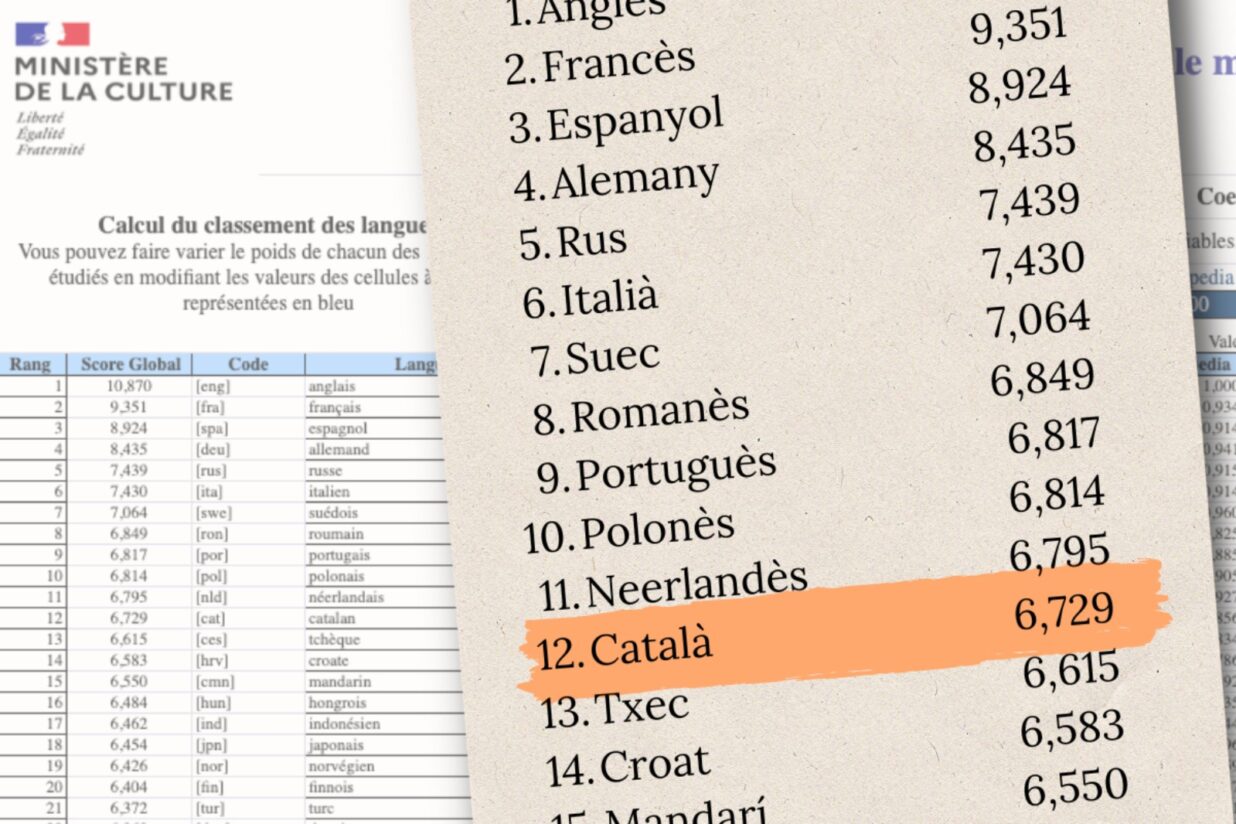24.02.2023 - 13:12
Among the more than six thousand languages in the world today, Catalan is one of the twelve most influential. This is one of the main conclusions of the latest World Language Barometer, published every five years by the French Ministry of Culture.
The number of speakers is often taken as the only criteria for assessing a language’s influence, but this model, developed by linguist Louis-Jean Calvet, incorporates a number of indicators that allow the importance of a language to be assessed holistically, beyond the linguistic sphere.
The influence of Catalan is highlighted here: with an aggregate score of 6.729 points, it is the twelveth language with the highest “weight” (influence) on the scale. It is eleven positions higher than in the previous Barometer (when it was in twenty-third place) and higher than more widely spoken languages such as Mandarin (6.550) or Indonesian (6.462). However, the Barometer also reveals a less positive fact: that Catalan still has a lot of work to do, especially in the political and social spheres.
A small language with global presence
Broadly speaking, the model differentiates between two types of factors: intrinsic factors and contextual factors. By intrinsic factors, the authors mean those of a more purely linguistic nature, “which concern a language and only that language”. Contextual factors, on the other hand, are all those social, political, cultural – or even technological – elements related to the environment in which a given language exists. And it pays special attention to “the influence of the environment on importance and development”.
The most important intrinsic factor taken into account by the authors when setting up the model is probably the indicator most often used to measure the influence of a language: the total number of speakers, with a distinction being made between native speakers (L1), which have a greater weight in the model, and foreign speakers (L2), which have a smaller weight. In this section, Catalan stands out as the language with the lowest index (0.357) of the fifteen most influential languages, a fact that highlights Catalan’s ability to project itself in relation to its limited demographic weight.
However, this is by no means the only element among the intrinsic factors that determine a language’s global coverage. A particularly interesting indicator is entropy, which measures the extent of a language’s geographical spread, i.e. the distribution of speakers in the different countries that make up the linguistic domain. Catalan has an entropy of 0.213 (as its linguistic domain is spread over Andorra, the Spanish state, the French state and Italy). Mandarin, on the contrast, although it has a hundred times more speakers, has an entropy of only 0.063, since it functions almost solely as a language of communication among people of Chinese origin.
Another element taken into account by the model is the vehicularity of a language, which measures its use as a preferred means of communication in its linguistic area. With a score of 0.910, Indonesian, used by tens of millions of people in South-East Asia, is the language to which the authors of the scale give the highest index of vehicularity, even higher than languages such as Swahili (0.863) or French (0.689). Catalan, with a score of 0.596, is average, although higher than languages with a higher overall weight such as Spanish (0.178), German (0.419) or Russian (0.437).
Catalan, very influential but with a low level of status
Louis-Jean Calvet’s model also pays attention to the status of languages, defined as “the degree of recognition of languages by the political authorities of the countries where they are spoken”. The authors specify that the model differentiates between de jure (theoretical) recognition and de facto (practical) recognition that a state grants to a language. Thus, they differentiate between “primary” languages and “co-official or secondary” languages: those which, although they enjoy legal and political protection, are often undermined by the primary languages shared in their linguistic area.
Although the authors do not explicitly mention it in the report that accompanies the barometer, the figures show that Catalan is a second language that is underrepresented – in this case by a first language, Spanish. Of the fifteen most powerful languages in the world, Catalan is by far the least valued: only 0.025, a figure that contrasts with that of English (1,000) or French (0.551).
Low presence at university, high visibility on the Internet
Another index in which Catalan does not score well is its presence in university education. As in the case of status, Catalan is the language with the lowest index in this section among the fifteen major languages. The figure for Catalan (0.431) is lower than that for languages that are equally or less widely spoken, such as Swedish (0.506) or Czech (0.488).
Where Catalan stands out most is in the Wikipedia index, which the authors of the Barometer calculate from the total number of articles that each language has in the digital encyclopaedia. At 0.856, Catalan enjoys a higher index than other more widely spoken languages, such as Romanian (0.825), or languages with a similar number of speakers, such as Czech (0.834). These figures confirm the good health of the Catalan-speaking Viquipedist community, one of the oldest in the world and one of the most active still today.
In terms of contextual factors, Catalan stands out in the Internet penetration index, which calculates the proportion of speakers of a language who use it on a regular basis on the Internet. With an exceptional 0.934, it has a higher index than four of the five most widely spoken languages in the world: English (0.911), French (0.909), Spanish (0.701) and Russian (0.813). In fact, the Internet penetration index is the section in which Catalan has the highest value in the whole scale. It is worth noting that the database on which this index is based only goes back to last year, before the controversy with Google over the use of Catalan in search results.
Social reproduction, an element of concern
Catalan also stands out in the Human Development Index (0.900), which measures the degree of economic, political and social development in the linguistic area of a language, based on UN data. In this respect, Catalan is more comparable to languages such as English (0.945), French (0.887) or German (0.976) than to Spanish (0.715) or Russian (0.763).
Fertility, on the other hand, is the contextual factor where Catalan registers the lowest index, at only 0.032. These results are particularly worrying given that, among the main languages that register low or lower scores, such as German or Italian, Catalan is the only one that is in a minority status in relation to another stronger language. These two factors together seem to cast doubt on the ability of today’s speakers to transmit the language to the new generations, a circumstance that raises all sorts of questions about the future of the language.
You can consult the report on the website of the French Ministry of Culture.



